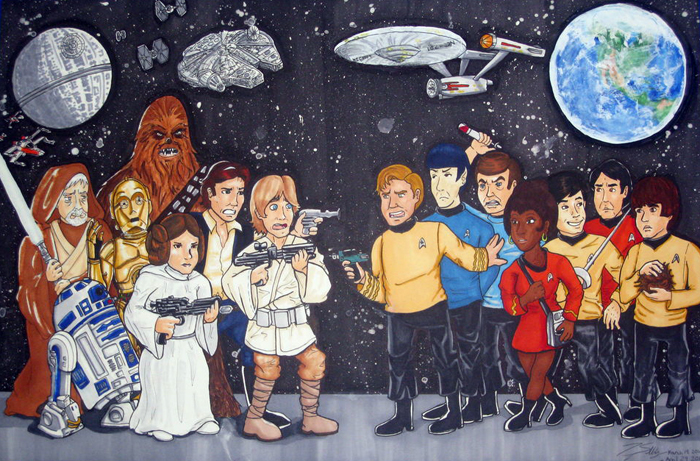This should be Star Trek’s moment. The franchise is celebrating its 50th anniversary, a new film is now in theaters and Comic-Con just delivered a peek at the latest Star Trek TV series.
So why are so many people still more enthusiastic about Star Wars? Because traditional storytelling still trumps 21st century revisionism and political correctness.
For decades, Star Trek has offered a hopeful vision of the future, albeit with plenty of progressive posturing. The United Federation of Planets (or “Federation”) is like a utopian and uncorrupted version of the United Nations that promotes peaceful space exploration and believes everyone in the interstellar universe should all just get along.
The TV series remains a classic, and the movie spin-offs have done moderately well at the box office. The most recent movie in the franchise, Star Trek Beyond, opened July 22 and earned $59 million in its opening weekend.
But that’s a pittance compared to what the most recent Star Wars film earned: $100 million in advance ticket sales; and once it was released, the movie became the top film of all time in domestic box office sales. The disparity holds true for the franchises’ respective series spin-off projects as well. The “first look” teaser for the new Star TrekTV series drew more than 3 million views on YouTube since its May debut. The first trailer for Rogue One, the Star Wars prequel, generated 40 million views since its April posting.
Why has Star Wars made a larger and more enduring impact on popular culture?
It has something to do with the virtues and values emphasized in each of the franchises. George Lucas may be a devout liberal in his personal politics, but the themes running through the Star Wars universe he created are deeply traditional: Good vs. Evil; Father vs. Son; Love vs. Hate; Courage vs. Cowardice; Freedom vs. Centralized power. The elemental battles that form the background of Star Wars date back to the dawn of storytelling, particularly the rise of empires and the rebellions that arise to dismantle them.
A focus on storytelling is what the Star Wars franchise temporarily forgot when it made the deservedly maligned trilogy of movies known as Episodes 1-3. Suddenly, we were asked to indulge a sullen Anakin Skywalker working through his anger and authority issues and made to endure Jar Jar Binks, a character cravenly created for marketing purposes (as were the cuddly Ewoks who debuted in Return of the Jedi, a movie whose original storyline had been much darker—and potentially less amenable to lucrative merchandising).
But The Force Awakens returned the series to its epic origins. Once more, we saw young heroes mature and the remnants of old foes reborn. The Skywalker family came back into focus in a way fans cheered. There were no lectures. No sloganeering. No attempts to force-feed its audience contemporary political messages.
By contrast, Star Trek has let PC niceties invade the franchise. The saga always had a political edge, of course. That was more welcome back when it began in the 1960s, when the series first aired. Who doesn’t applaud the fact that the series showcased one of the first interracial kisses on television between actors William Shatner and Nichelle Nichols? But these boundaries no longer exist (unless you believe the fictions peddled at last month’s Democratic National Convention). What seemed revolutionary in 1966 is now the norm, and thank goodness for it.
But the latest offerings from the Star Trek universe have allowed political correctness to undermine storytelling. Star Trek Beyond makes Lieutenant Sulu gay, for example, even though the actor who originally played Sulu on TV, George Takei, was against the move. And it’s not just sexual orientation; an earlier movie, Star Trek Into Darkness, featured a whining Scotty complaining about killing terrorists and made many thinly-veiled criticisms about American military power in the aftermath of the 9/11 attacks.
By contrast, Star Wars has mostly avoided wading into the murk of the culture wars (an irony, given that the same director who helmed Star Trek Into Darkness, J.J. Abrams, is now with the Star Wars movies). We haven’t seen any major characters undergo a gender or ethnic switch, and the latest movie, although it featured a woman and a black man in its lead roles, doesn’t do so for the sake of PC pandering. The story keeps its focus on the deeply-rooted bonds among the characters and their battle against an evil empire; and there’s no handwringing when a Storm trooper needs to be taken out, either.
In other words, it showcased storytelling, not agenda-peddling. As long as Star Trek caves to cultural pressures to promote Hollywood’s political agenda, it will remain a distant second place to the epic—and far more satisfying—Star Wars.
—
This article was republished with permission from Acculturated.
[Image Credit: Billionaire Boys Club]
















Leave a Comment
Your email address will not be published. Required fields are marked with *